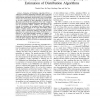Free Online Productivity Tools
i2Speak
i2Symbol
i2OCR
iTex2Img
iWeb2Print
iWeb2Shot
i2Type
iPdf2Split
iPdf2Merge
i2Bopomofo
i2Arabic
i2Style
i2Image
i2PDF
iLatex2Rtf
Sci2ools
125
click to vote
CEC
2007
IEEE
2007
IEEE
On the analysis of average time complexity of estimation of distribution algorithms
— Estimation of Distribution Algorithm (EDA) is a well-known stochastic optimization technique. The average time complexity is a crucial criterion that measures the performance of the stochastic algorithms. In the past few years, various kinds of EDAs have been proposed, but the related theoretical study on the time complexity of these algorithms is relatively few. This paper analyzed the time complexity of two early versions of EDA, the Univariate Marginal Distribution Algorithm (UMDA) and the Incremental UMDA (IUMDA). We generalize the concept of convergence to convergence time, and manage to estimate the upper bound of the mean First Hitting Times (FHTs) of UMDA (IUMDA) on a well-known pseudo-modular function, which is frequently studied in the field of genetic algorithms. Our analysis shows that UMDA (IUMDA) has O(n) behaviors on the pseudo-modular function. In addition, we analyze the mean FHT of IUMDA on a hard problem. Our result shows that IUMDA may spend exponential generat...
Artificial Intelligence | Average Time Complexity | CEC 2007 | Distribution Algorithm | Time Complexity |
Related Content
| Added | 02 Jun 2010 |
| Updated | 02 Jun 2010 |
| Type | Conference |
| Year | 2007 |
| Where | CEC |
| Authors | Tianshi Chen, Ke Tang, Guoliang Chen, Xin Yao |
Comments (0)

